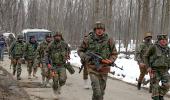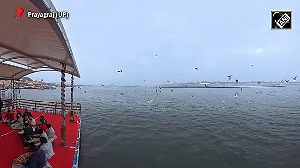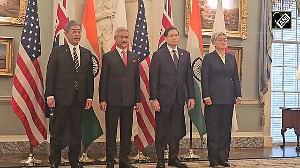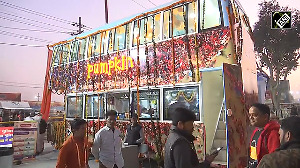On a mission to visit the families of soldiers who have died in action, Vikas Manhas has met over 1,000 families whose loved ones made the supreme sacrifice for the country.

As the country was putting up flags in their homes to mark the 75th year of Independence, Jammu native Vikas Manhas was meeting families who honour the flag not on a day, but on each and every day.
These are no ordinary flags, but sacred and revered; placed in the most exalted spaces inside homes in memory of loved ones killed in action in the service of the country.
These are flags that covered the bodies of sons, husbands, fathers, brothers when they were brought home.
Flags that were respectfully folded and presented to the family by personnel of the Indian Armed Forces in a final salute to the brave soldier.
"For the families of the brave who sacrificed their lives for the nation and came home wrapped in the tricolour, it is har din tiranga, while it is har ghar tiranga for us only on August 15," says Mr Manhas who spent Independence Day with three families in Chandigarh who lost their sons in the service of the country -- Captain Tushar Mahajan, Lieutenant Amtoj Singh Sidhu and Gentleman Cadet Amul Rawal.
Captain Tushar Mahajan, Shaurya Chakra, 9 Special Forces was killed in action leading a late night commando operation against terrorists in Kashmir on February 21, 2016. He was struck with four bullets while flushing out terrorists from a building in Pampore, Pulwama district, and breathed his last at the army hospital in Srinagar.
Lieutenant Amtoj Singh Sidhu, 64 Cavalr,y tragically lost his life in a road accident in Bhilwara, Rajasthan, enroute to attend the Indian Army's Young Officer's course in 2021.
Gentleman Cadet Amul Rawal died during training at the Indian Military Academy in Dehradun. The young cadet fell into a gorge during a night navigation exercise and suffered head injuries in 2019.
The morning of Independence Day, Mr Manhas had breakfast with Gentleman Cadet Rawal's parents. Above the breakfast table were his pictures, medals and plaques from the academy.
"Every day aunty, his mother, sends a good morning and good night message. I may forget, but she never forgets," Mr Manhas tells Rediff.com's Archana Masih over the phone from Chandigarh where he is staying with Captain Mahajan's family.
Later that day, he spent time with Lieutenant Amtoj's family before his mother, a teacher, left for the school's Independence Day celebration.

In the days before Independence Day, he has visited the families of 6-8 soldiers who died in the line of duty.
It was the best way to commemorate the nation's 75th year of freedom.
Since 1999, post the Kargil War, Vikas Manhas has visited the families of over 1,000 soldiers who came home wrapped in the national flag.
"It is my gesture of thanksgiving to the brave men who came to protect me and never returned home, and to honour their families," says Mr Manhas who runs a small travel agency and splits time between his native Bhaderwah and Jammu city.
These visits are a pilgrimage for him which he undertakes for a few months every year. In the early days, when he didn't have a landline telephone or a mobile phone, he would make calls to the homes of the fallen brave. He would look for whatever information he could find in the newspapers, find out addresses and write letters to the families.
The coming of Facebook, WhatsApp and Twitter revolutionised information gathering, keeping in regular touch with the families and spreading the message about the sacrifice of fallen soldiers and the families they leave behind to a mass audience.
Every other day, Mr Manhas's Twitter and Facebook updates include birthdays, death anniversaries, pictures and information about soldiers who have sacrificed their lives for the nation. There are pictures of their family members with a brief and moving account of how they cope with life after losing someone most precious to them.

Vikas Manhas started his personal journey of paying homage to fallen soldiers after the Kargil War in 1999.
But his awakening about the armed forces began on a terrifying night in Bhaderwah in 1994 when terrorists ambushed an army picket manned by 8 soldiers. The sound of bullets rent the air through the night. Morning brought the news that 7 soldiers had died in action.
In those days, there was no policy of sending the bodies of soldiers home, only the ashes were sent back. Hence, the cremation was performed in the village. Vikas Manhas gave shoulder to the mortal remains and remembers a few drops of blood falling on his shirt.
The seven bodies were laid on a single pyre and consigned to the flames in the presence of villagers and Indian Army personnel.
The final rites left him very sad that the families of the brave did not have the opportunity to see their loved ones for the last time.
The thought remained with him for years till the Kargil War brought in much needed policy change and the bodies of soldiers were sent home for final rites conducted with full military honours.
The War also gave Manhas a mission for life.
Five months after the War, he went to the house of a soldier who sacrificed his life in the Battle of Tiger Hill.
Grenadier Udyaman Singh from 18 Grenadiers was from a village 15 km from Manhas's home.
He met the grenadier's mother and sisters and spent the first few hours in silence, sitting on a carpet with pictures of the soldier.
Later in the afternoon, while he was having tea, the soldier's mother looked at her son's picture and started talking about him.
She spoke for an hour and was joined by her daughters. Mr Manhas only left the home after spending the whole day with them. The family was surprised to know that he was not from the army, but a civilian.
Since then, he has met the family many times. Every year, he spends time going to homes of brave men who died in the line of duty to pay his respects. He stays with them and uses local transport. Since the area surrounding his hometown Jammu is home to several families of fallen soldiers, he meets them more often.
The others, he keeps in touch over WhatsApp and social media.
Many a times, other civilians contact him and they travel together to meet families in a particular area.
Recently, he was invited by the ministry of defence to share his feedback gathered through his meeting with the families.
He shared 6-7 case studies and suggested that when a deceased soldier is survived by both his parents and wife, the pension should be divided between both.
"There are many instances of parents facing a difficult financial situation because they are not the next of kin if the soldier is married. Whatever is due to the soldier should be shared by both because parents also make a big sacrifice," he says.
"The other important point that I have raised is that the pension received by next of kin of battle casualties is more than those of physical casualties (accident, heart attack etc while on duty). There should be no discrimination and the same amount should be given for both casualties."
"The loss for his family is as acute and painful whether a soldier has died in battle or has a heart attack while serving at his base," he says.

Few days ago, he met Mrs Usha Yadav, mother of Major Sankalp Yadav, Sena Medal, in Jaipur. Major Yadav was a helicopter pilot with bthe Army Aviation Corps. His helicopter crashed en route to a high altitude evacuation mission in Bandipora, J&K on March 11, 2022.
"There are so many mothers like Usha aunty who hardly ever get covered by the media," he says.
In a few days, Mr Manhas will return to Jammu, and will soon set course to meet another family of another brave soldier.
"There are so many. It is an ongoing process," he says.
Feature Presentation: Aslam Hunani/Rediff.com











 © 2025
© 2025